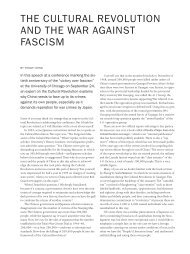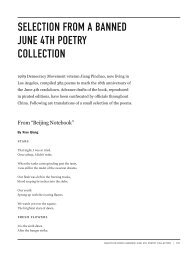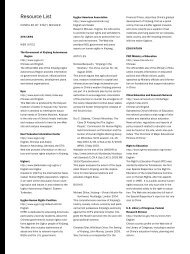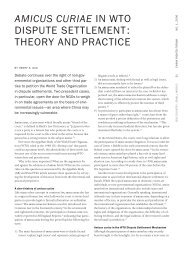STATE SECRETS: CHINA'S LEGAL LABYRINTH - HRIC
STATE SECRETS: CHINA'S LEGAL LABYRINTH - HRIC
STATE SECRETS: CHINA'S LEGAL LABYRINTH - HRIC
Create successful ePaper yourself
Turn your PDF publications into a flip-book with our unique Google optimized e-Paper software.
2 HUMAN RIGHTS IN CHINA <strong>STATE</strong> <strong>SECRETS</strong>: CHINA’S <strong>LEGAL</strong> <strong>LABYRINTH</strong><br />
In 2003, when Hong Kong officials tried to confirm reports concerning Severe<br />
Acute Respiratory Syndrome (SARS), a Guangdong health official told them that<br />
there was a legal requirement at that time that infectious diseases had to be classified<br />
as state secrets. The control of critical information and lack of transparency<br />
continued to plague the response to the SARS epidemic, which spread and, to date,<br />
has infected thousands and killed nearly 800 worldwide.<br />
On November 13, 2005, an explosion at a petrochemical plant in Jilin released<br />
more than 100 tons of toxic chemicals, including benzene, into the environment,<br />
which subsequently poisoned the Songhua River. Ambiguity in the regulations<br />
concerning reporting on industrial/pollution accidents and questions concerning<br />
the classification of this information added to the confusion in reporting the<br />
incident. Only ten days after the explosion and one day after the water was shut off<br />
in Harbin did the State Environment Protection Administration (SEPA) admit<br />
serious pollution of the river. Eventually water was cut off to nine million residents<br />
in Harbin, and the polluted water flowed across the Russian border.<br />
Tan Kai (谭凯), a computer repair technician from Zhejiang, was formally<br />
indicted on April 29, 2006 on charges of “illegally obtaining state secrets,” ostensibly<br />
for information he had obtained while doing routine file back-ups for his<br />
clients, in particular for work he did in 2005 for an employee of the Zhejiang<br />
Provincial Party Committee. However, Tan is also an environmental activist and<br />
on November 15, 2005 the Zhejiang provincial government declared Green<br />
Watch—the organization Tan helped found—an illegal organization, calling into<br />
question the real reason he was prosecuted. Tan was sentenced to 18 months’<br />
imprisonment on August 11, 2006 by the Hangzhou Municipal People’s Intermediate<br />
Court on the state secrets charge.<br />
Lu Jianhua (陆建华), a prominent sociologist with the Chinese Academy of Social<br />
Sciences, was reportedly sentenced to 20 years for “leaking state secrets” in a case<br />
linked to that of Hong-Kong based reporter Ching Cheong (程翔), who was sentenced<br />
in August 2006 to five years for “spying.” Lu was well known for the essays<br />
he wrote and his appearances on TV talk shows and often assisted Ching with articles<br />
on the political and social situation in China that were published in the Singapore<br />
newspaper The Straits Times. Some Chinese officials claimed that three of<br />
these articles, published in 2004, contained state secrets.







